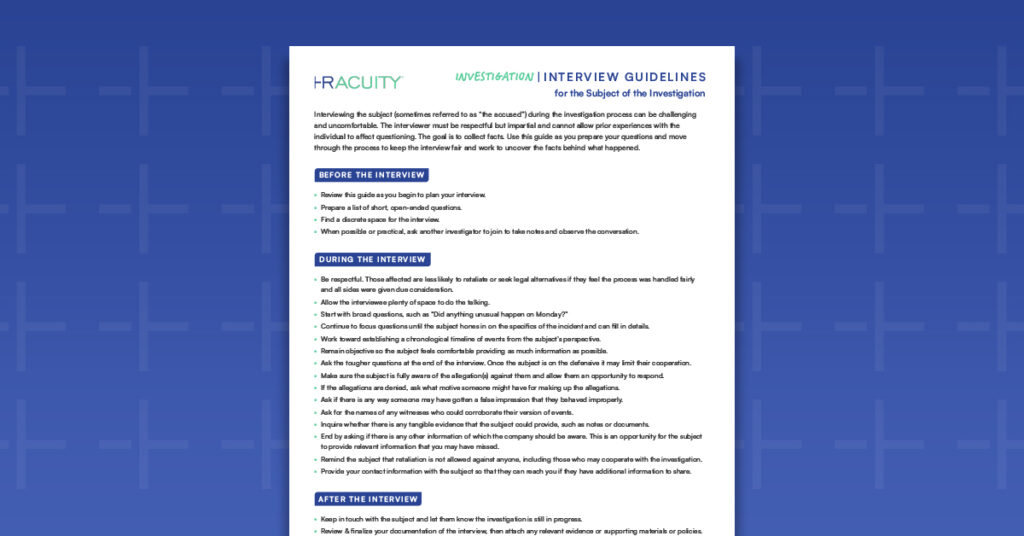Workplace investigations are hard. Not just for employees—but for you, the HR pro responsible for getting to the truth while keeping the process fair, calm, and compliant.
When you’re tasked with leading an employee investigation interview, it’s easy to feel uncertain. What if you ask the wrong question? Miss a key detail? Or inadvertently bias the process?
This guide is for you.
Whether you’re new to investigations or just need a refresh, we’ll walk you through:
-
What makes a great investigation interview
-
What to prepare before the conversation
-
How to phrase your questions (with examples)
-
What tools can make this easier — and more consistent
By the end, you’ll be ready to lead interviews that are thorough, respectful and ready to stand up to scrutiny.
Why Are Investigation Interviews Important in HR and Employee Relations?
Effective investigation interviews aren’t about proving guilt or innocence. They’re about gathering facts — consistently and impartially. Done right, they:
-
Generate credible information that leads to fair resolutions
-
Show employees that HR takes concerns seriously
-
Reduce exposure to risk, litigation and bad PR
-
Create audit-proof records that protect the organization
When they’re rushed or mishandled, though?
-
You lose critical information
-
Employees disengage or shut down entirely
-
Legal risk escalates (especially around retaliation or bias)
-
Trust in HR erodes fast
That’s why structure and preparation aren’t “nice to have.” They’re your best defense — and your best path to clarity.
How Should I Prepare for an Employee Investigation Interview?
Preparation is critical to conducting an effective interview. Before meeting with the interviewee, there are several tasks you should complete to self yourself up for success.
Review the case file
Before you meet with anyone, gather everything you can:
-
The original complaint or report
-
Any written or verbal statements
-
Relevant policies (harassment, conduct or performance)
-
Prior incidents involving the people or issues at hand
Look for consistencies, gaps and areas that need clarification. These will guide the questions you draft.
Pro Tip: An effective workplace investigations platform (like HR Acuity) should offer AI-generated interview questions. It’s like having a second brain for prep.
Choose the right setting
Your environment sets the tone. You want neutral, quiet and private — free from interruptions.
Do:
-
A private office or conference room
-
A video call with the camera on, scheduled in advance
Don’t:
-
Open spaces, break rooms or shared desks
-
Ambush-style meetings (“Can we chat real quick?”)
Employees need to feel safe to speak. That starts with you picking the right space.
Draft open, unbiased questions
Use questions that prompt narrative answers without leading or making assumptions. Think of questions like:
-
“Walk me through…”
-
“Help me understand…”
-
“What did you see or hear?”
-
“Who else was there?”
Avoid:
-
“Why did you do that?”
-
“Do you think that was appropriate?”
-
“Would you say [person] was being aggressive?”
What Are the Best Practices for Interviewing Employees During an Investigation?
During the interview itself, lean into the following best practices.
Start with reassurance
Set the tone from the beginning. Let them know:
-
Why this conversation is happening
-
That your role is to gather information, not assign blame
-
That you’ll maintain confidentiality as much as possible
-
That retaliation is strictly against company policy
Explain that you’re committed to a fair, thorough process.
Begin broadly, then narrow
Starting too direct right away can shut someone down. Instead:
-
Begin with context:
-
“Can you tell me what your typical day looks like?”
-
“What’s your working relationship like with [person]?”
-
-
Move into the incident:
-
“Tell me about what happened on [date].”
-
“What did you observe or hear?”
-
-
Clarify:
-
“Who else was present?”
-
“When did that happen?”
-
“Has this happened before?”
-
Stay neutral and objective
Listen more than you speak. Avoid judgmental language or leading questions. Save more challenging inquiries for later in the interview once you have built rapport with the interviewee.
Ask about witnesses and evidence
Ask directly:
-
“Is there anyone else who saw or heard what happened?”
-
“Did you communicate with anyone about this?”
-
“Is there any documentation, like messages or emails, that might help clarify?”
Close clearly
Before wrapping up:
-
Ask: “Is there anything I haven’t asked that you think I should know?”
-
Reinforce your anti-retaliation policy
-
Let them know what happens next — and how to reach out if they remember anything else later
Leave the door open while closing the loop.
Remind the interviewee of the retaliation policy
Remind the interviewee before you finish the interview that retaliation is unacceptable at your organization. You can also point them to any relevant documentation.
How Do I Document and Follow Up After an Investigation Interview?
The work does not end when the interview is over. Accurate, thorough documentation is vital. Here’s how.
Finalize your notes promptly
Right after the interview is complete, capture:
-
Facts
-
Direct quotes
-
Observations (body language, tone or hesitation — without interpretation)
-
Any referenced documents or evidence
The sooner you write it down, the more reliable your documentation.
Keep the process transparent
You don’t need to share every detail (and you shouldn’t!), but you should:
-
Reaffirm that the matter is being taken seriously
-
Explain next steps in general terms
-
Thank them for their time and openness
Stay alert to retaliation
Even with clear policies, retaliation can happen subtly. Check in periodically with those involved and remind them how to report concerns.
What Tools Can Help Me Manage Workplace Investigations More Effectively?
Managing investigations manually is risky. Details get missed. Documentation gets scattered. Timelines slip.
HR Acuity’s investigation management platform solves for that with:
- Interview templates to keep your questions consistent and thorough
- AI-powered question generators tailored to your case type
- Centralized case tracking with permissioned access
- Audit trails and analytics to track trends and risks
The result? Faster investigations. More consistent outcomes. And far less stress for your team.
Supercharge Workplace Investigations with Investigation Interview Best Practices
Investigation interviews are challenging, but they don’t have to be chaotic. With the right mindset, structure and tools, you can lead conversations that are professional, empathetic and hold up in court if they have to.
And the more consistent your process, the more your organization — and your people — can trust it.
Download our investigation interview guidelines to learn more.




